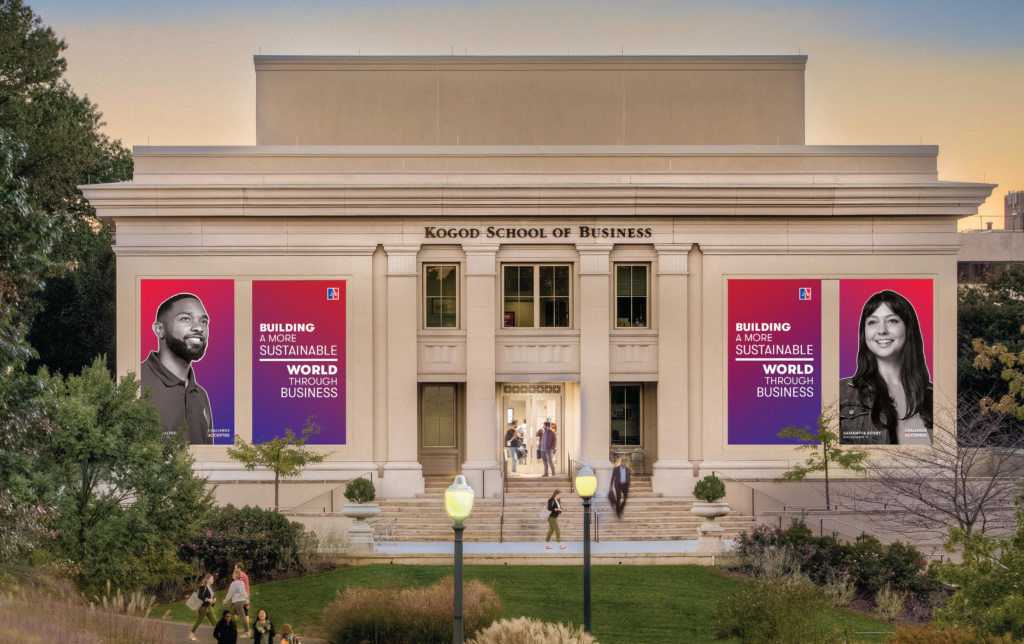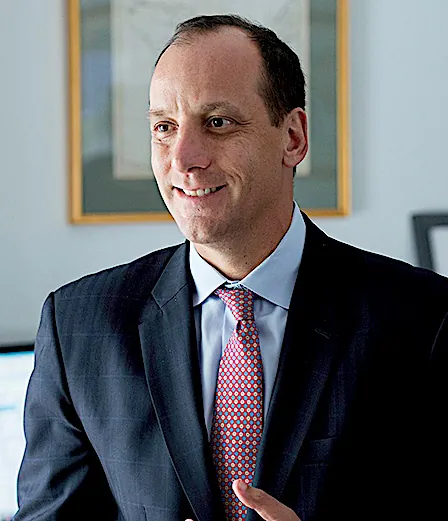
Kogod School of Business is embracing a student-focused approach to AI
Over the past 18 months, some 25 CEOs have trekked to American University’s Kogod School of Business to share their expertise and wisdom with students. But it was two of those executives that prompted Dean David Marchick to lead one of the school’s most ambitious initiatives ever.
When Google President Kent Walker came to campus in February of last year to discuss the development of artificial intelligence, he noted that CEO Sundar Pichai likened AI to the discovery of fire and electricity. Shortly after, Brett Wilson, a San Francisco venture capitalist and managing partner of Swift Ventures, told students that “AI won’t replace your job, but another person who knows AI might replace you if you don’t know how to use AI in whatever you do – accounting, investing, marketing, or management.”
“Those two speakers made me just click,” recalls Dean Marchick. “They really shaped my thinking. I said to my senior associate dean we have got to run, not walk. It is a revolution and we are trying to get in front of the parade.”
A CONCRETE AND EXTENSIVE AI MAKEOVER AT KOGOD

David Marchick will become dean of American University’s Kogod School of Business
While many business schools are deepening the use of AI and machine learning in research and scholarship, Kogod today (March 26) announced a major student-focused makeover that puts AI front and center at a school that has already established a focus on sustainability. The school plans to incorporate AI throughout its coursework, offer AI credentials for students, invest in faculty and staff training, partner with the private sector, and create processes to ensure that it remains current as AI technology evolves. Kogod also infuse AI into areas where the school’s major strengths: are sustainability, entrepreneurship, business and entertainment, and analytics.
The initiative stands out for how concrete and extensive Kogod’s commitment will be to this transformative technology. Starting in the fall of this year, every Kogod student will learn how to use AI to code a program, build a powerful presentation, underwrite an investment, analyze a data set, navigate different AI platforms, and perform financial analysis. “Course delivery at Kogod, by necessity, will also need to change,” Marchick notes in an email to the faculty and staff. “AI integration will lead to additional emphasis on project- and team-based and experiential learning opportunities.”
The school will offer more than 20 courses as electives for students, including classes that will offer deep immersion into the use of AI in a specific context, including hands-on projects, labs, and case studies where students will apply AI to real-world problems. Starting in fall 2024, all incoming graduate students will complete an AI workshop during orientation before the start of their programs. Kogod will offer AI certificate and badging programs, enabling students to highlight their AI fluency on their resumes and stack courses towards degrees. The undergraduate core Kogod curriculum will include a new, required intro technology course that covers AI, machine learning, and Python concepts.
BRINGING IN PRIVATE SECTOR EXPERTS IN AI TO TRAIN FACULTY AND STAFF
Another unusual feature of the initiative is Kogod’s investment Kogod in training faculty and staff. Instead of asking its own faculty who have already embraced AI to teach others, the school is bringing in experts from the private sector. They will instruct professors and administrative staff on such things as prompt engineering, the use of various AI platforms in each of their fields of expertise, and exercises to incorporate AI into courses and daily use. Marchick named one of the school’s professional lecturers, Angela Virtu, as “AI Instruction Faculty Fellow” to organize the training programs. A 35-year-old data scientist, Virtu has built AI solutions for a number of pre-IPO companies for the past 12 years. “We put a young person in charge of training the faculty because she will be faster and more connected with trends in the private sector,” says Marchick.
“This initiative is student-focused,” he maintains, “helping to ensure that all Kogod students have these tools as they enter the workforce. “We wanted to do something student-focused to give them the tools to compete for jobs with the best under the theory that many of us are now dinosaurs. This goes way beyond ChatGPT because in every field there are specialized AI tools. So any student, whether an undergraduate or a master’s student, who graduates will have fluency in AI in whatever field they want to pursue. This is not about someone being the best programmer. It’s about someone going into consulting or finance or accounting or HR.”
”
After hearing what the speakers from Google and Swift Ventures had to say, Marchick put together a faculty group in December, giving the professors six weeks to provide recommendations for how to proceed with an AI initiative. The group came back in February, and spent roughly a month assembling a plan which was then “socialized” before a wide range of stakeholders. “I have run it by three dozen executives and consultants,” says Marchick. They helped inform the plan’s ambitious agenda announced today.
ONE BIG SURPRISE: HOW QUICKLY KOGOD MOBILIZED THE AI MAKEOVER
“We went out and said how are you using AI?,” recalls Marchick. One adjunct faculty member, a former head of marketing at Sony and Marvel who now has 50 graphic designers and three agencies working under him at PBS, helped make the case for the transformative nature of AI. “He went to an AI image creation program for the Ken Burns documents on The American Buffalo and saved hundreds of hours,” explains the dean. A partner at the global investment firm Carlyle, where Marchick had been a member of the investment committee, underlines the tool’s usefulness in automating data analysis.
“She says AI allows us to underwrite companies, do discounted cash flow and other kinds of analysis,” says Marchick. “If they are looking at a roofing company, they can say ask AI for the trends in sales of shingled roofs for every publicly traded company over the last 16 quarters. It can analyze all the public reports for every public company in the world. She told me that, ‘This program does what I did when I was 22 and an analyst.'”
Matthew Pine, the CEO of Xylem, a water technology company, told Marchick how his firm is using AI to find water leaks, monitor water usage and maintain a more sustainable water supply.
One of the biggest surprises is how fast Kogod was able to move on its initiative. “What I’m proud about is that we moved with private sector speed,” Marchick tells Poets&Quants. “After starting in December from scratch, we will have all of this in place for students coming in the fall. It shows that schools can move with speed. MIT and Stanford are way ahead on the research side. We are not trying to compete with them. But we are pushing faster and further on a student-focused approach.”
The most challenging part of the makeover? Embedding AI into the entire curriculum. “The key thing is going class by class and figuring out how to infuse AI into those classes,” he says. “It’s easy in an IT class. The faculty are already using it there. But we have a fantastic forensic accounting expert on the faculty. She worked for Arthur Anderson and did the Enron case. She said, ‘Alright, I have to go back to school.’ So this summer she went to the trade association and signed up for four or five modules in forensic AI so she can teach our students.”
DON’T MISS: THE P&Q INTERVIEW: CARNEGIE MELLON TEPPER DEAN ISABELLE BAJEUX-BESNAINOU ON AI or TEN AI & MACHINE LEARNING EXECUTIVE EDUCATION COURSES FOR 2024










